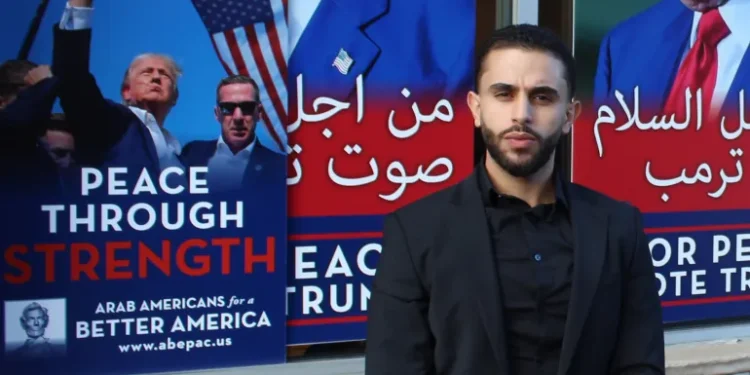In the final days leading up to the election, Donald Trump’s campaign rally took a strategic turn with his outreach to Michigan’s Muslim and Arab American communities. At the rally, two prominent Michigan mayors, Amer Ghalib of Hamtramck and Bill Bazzi of Dearborn Heights, took center stage to encourage voters from their communities to support the former president, stressing the critical impact their vote could have on the outcome of the election. Both mayors highlighted Trump’s efforts to connect with Arab Americans and Muslims during his campaign and called on them to make their voices heard at the polls.
Trump’s appeal to these communities comes amid growing discontent among Arab Americans and Muslims, particularly in Michigan, with the Biden administration’s handling of the ongoing Israel-Hamas conflict. Over recent weeks, tensions have risen, and many in these communities have expressed frustration with what they perceive as a lack of strong action or a clear stance from the current administration. This dissatisfaction has opened a window of opportunity for Trump, who has long sought to gain favor among these voter groups.
Trump’s position on foreign policy, especially his commitment to ending what he has called “endless wars,” resonates with many voters disillusioned by U.S. involvement in Middle Eastern conflicts. During his presidency, Trump brokered the Abraham Accords, a series of normalization agreements between Israel and several Arab nations, which he frequently touts as one of his major diplomatic achievements. His administration’s approach to Middle Eastern relations, in contrast to the policies of the Biden administration, has become a focal point of his campaign as he seeks to secure a broader base of support.
Trump’s efforts in Michigan are particularly significant because the state has a large Arab American population, particularly in the Detroit metropolitan area. This community has long been a crucial swing vote, and its influence could be decisive in an election expected to be determined by narrow margins. In fact, recent polling data has suggested that Trump may have gained ground among Arab Americans in the state. A survey conducted by YouGov, commissioned by the Arab News Research & Studies Unit, found that Trump held a slight edge over Kamala Harris, leading 43 percent to 41 percent. This marks a potential shift in voting patterns, as many Arab Americans traditionally lean Democratic, especially in areas with significant Palestinian and Muslim populations.
The growing support for Trump in these communities can be attributed to several factors, including his rhetoric surrounding U.S. foreign policy, his advocacy for reducing American military involvement abroad, and his stance on issues such as the Iran nuclear deal, which he withdrew from during his presidency. For many Arab Americans, Trump’s foreign policy decisions were seen as more aligned with their concerns about the U.S.’s engagement in the Middle East and the broader Muslim world.
Moreover, Trump’s outreach has been personal and direct. Throughout the campaign, he has actively courted Muslim and Arab American voters by attending rallies in communities with large Arab populations and engaging with local leaders. His campaign has also focused on addressing issues that resonate within these communities, such as economic opportunities, public safety, and cultural respect. This targeted outreach has helped Trump build relationships and increase his visibility among potential voters who might have previously been less inclined to support him.
In contrast, the Biden administration’s handling of the Israel-Hamas conflict has been a point of contention for many within these communities. While President Biden has called for a balanced approach to the situation, including supporting Israel’s right to defend itself while also urging humanitarian aid to Gaza, his stance has been perceived by some as insufficiently critical of Israeli actions. This has led to frustration among many Arab American voters who feel that their concerns regarding the conflict are not adequately addressed by the current administration.
For Trump, gaining support among Michigan’s Arab American and Muslim voters could prove critical in a tight race. Michigan has long been a key battleground state, and the outcome of the election may hinge on the participation and preferences of these voter groups. In recent years, Michigan has seen significant political shifts, with the state narrowly flipping to Biden in 2020. However, a more engaged and energized Arab American electorate could potentially tip the scales in Trump’s favor.
Ultimately, the outcome of this election will likely be shaped by how various demographic groups, including Arab Americans and Muslims, decide to cast their votes. With both major parties vying for their support, Michigan’s Arab American population will once again find itself at the heart of a national political debate. For Trump, securing even a small but significant portion of this electorate could prove to be the difference-maker in what is expected to be a highly contested race. The final days of the campaign will likely see continued efforts by both sides to woo this critical voting bloc, underscoring the increasing importance of Arab American and Muslim voters in shaping the future of U.S. politics.
Discover how the upcoming election will affect American workers:


